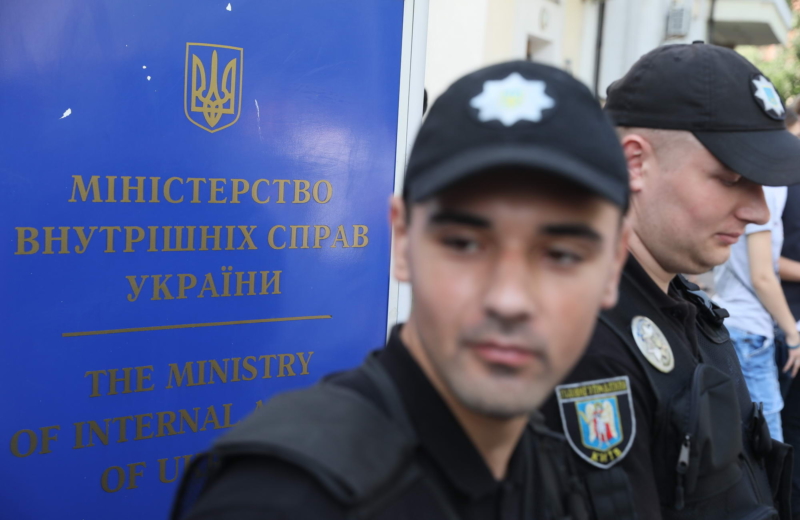BRUSSELS – Reforms are stalling in the security and law enforcement sector in Ukraine because officials are fearful of making mistakes, according to Kęstutis Lančinskas, the head of the European Union Advisory Mission Ukraine, or EUAM.
Speaking to the Kyiv Post, Lančinskas said reforms are moving but “not in a comprehensive and rapid way, as the people of Ukraine would wish to see.”
“The main problem is a question of mentality and understanding,” Lančinskas said. There is a big fear of making mistakes because of very heavy criticism from non-government organizations. But when you’re going for comprehensive reforms you can’t avoid mistakes. That’s the main reason why final decisions quite often get stuck somewhere. There’s no final decision.”
The EUAM formally began operations at its headquarters in Kyiv on Dec. 1, 2014, and Lančinskas, a Lithuanian, joined to Mission since February 1, 2016. His team of over 300 Ukrainian and international staff are based principally in Kyiv – with presences also in Kharkiv, Lviv and Odesa.
The team helps the Ukrainian authorities with strategic advice and training for reforms of the National Police, prosecutors’ offices, security services and so on.
“We assist with the implementation of strategic documents and decisions taken during the reform process,” Lančinskas said. “We’re an advisory mission, and our business is to advise. So the final decision always has to be taken by the Ukrainian side.”
“We have discussions, we do preparations, we develop an elaborated strategy, but when a final decision has to be made there is fear from the political side of taking it. From my understanding, there are two reasons. One is a lack of trust: in Ukraine, public trust in the government is at a very low level, while another issue is the fear of being heavily criticized and the fear of making mistakes.”
However, he also said there were “a lot of economic and political issues,” causing Ukrainian officials to drag their heels on reform.
Lančinskas was involved at a senior level in major reforms in his home country, including Lithuania’s preparations for EU accession in 2004 and its entry into the EU’s border-free Schengen area in 2007.
He said that Ukrainian officials only take “around half” of EUAM’s advice because of their “mentality.”
“People still think that Ukraine is so unique, that they have a different way of thinking, that Ukrainian people are so different from others and our expertise and methodology will not be effective for Ukraine,” Lančinskas said.
He said that from the very beginning EUAM met “huge resistance” from the prosecutor’s office, which argued that Ukraine has a different legal system, a different culture of criminal investigation and thus EUAM expertise “would not work.”
“(But) with a pilot project over the entire year of 2017, in eight police stations selected together with the National Police, we proved that it does work, and we got a brilliant result… It’s called the criminal investigation ‘merger’ project, which simplifies the investigation of crimes by merging the functions of police investigators and (ordinary officers). The idea is to create one officer – a detective.
“This is the vision for criminal investigation in Ukraine, and that is the way it is moving thanks to EUAM support and the merger project. The chief of the Ukrainian police, Sergiy Knyazev, has decided to introduce it throughout the whole country. This means a change in the way of thinking, not being afraid to go for changes, not to be afraid to move forward. This is the main issue.”
According to a comprehensive study of attitudes among regional police officers conducted in two regions, around 30 percent of staff members, mainly young people, are committed to reforms and would like them to go forward. Around 40 percent were taking a “wait-and-see” position, and the remaining 30 percent of older officers said that “everything in the past is nice, and now there is chaos, and there is no need for (more) changes.”
“My understanding is that we should focus on motivating those 40 percent, who are ‘waiting to see,” Lančinskas said. “I was speaking to some of them and they said: ‘Ok, why should I be very enthusiastic about reforms? We had reforms in 2004, nothing happened; then we had reforms in 2008, again a failure, so why should I be enthusiastic now? I’ll sit down and wait to see if everything goes well, and then I’ll join you.’”
To win these officers over, EUAM is providing leadership training for senior officers in the National Police.
“But there is still a problem with mentality – we have to change the way of thinking,” Lančinskas said. “This isn’t easy. We need time.”
Regarding the possibility of civil unrest during or after the upcoming elections next year, Lančinskas said that the police need to have support from all political sides, as well as back up from proper legislation.
“For example, a comprehensive revision of amendments of the Criminal Procedure Code is needed. Why? For effective investigations of these kinds of crimes you have to have proper legislation… That is the reason why we proposed to go for a comprehensive revision of the code.”
“And that’s the reason why support (for the police) from political parties, from the community, is important, important to increase the level of trust between community and police officers and investigators especially. Why? Because without trust it is not possible to be effective. If nobody trusts the law enforcement agencies, how you can investigate crimes, especially major crimes?
“You need to build up trust in relations. Everybody should understand that. Without this, there will be no movement forward.”



